Related Research Articles
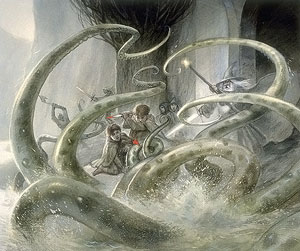
The Watcher in the Water is a fictional creature in J. R. R. Tolkien's Middle-earth; it appears in The Fellowship of the Ring, the first volume of The Lord of the Rings. Lurking in a lake beneath the western walls of the dwarf-realm Moria, it is said to have appeared after the damming of the river Sirannon, and its presence was first recorded by Balin's dwarf company 30 or so years before the beginning of The Fellowship of the Ring.

Ellen Louise Ripley is a fictional character and the original protagonist of the Alien film series, played by American actress Sigourney Weaver. Considered one of the greatest characters in science fiction film history, the character earned Weaver worldwide recognition, and remains her most famous role to date. Although she was originally conceived as male for the first Alien film, director Ridley Scott decided early in production to make her a woman.
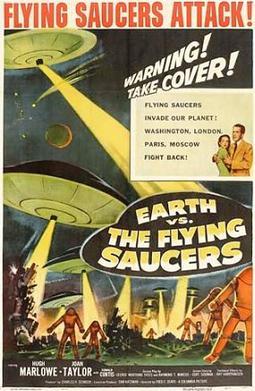
Earth vs. the Flying Saucers is a 1956 American science fiction film from Columbia Pictures. It was produced by Charles H. Schneer, directed by Fred F. Sears, and stars Hugh Marlowe and Joan Taylor. The stop-motion animation special effects were created by Ray Harryhausen. The storyline was suggested by the bestselling 1953 non-fiction book Flying Saucers from Outer Space by Maj. Donald Keyhoe. The film was released as a double feature with The Werewolf.

Star Hunter is a 1995 science fiction film directed by Cole S. McKay and Fred Olen Ray, and starring Roddy McDowall and Stella Stevens. The eponymous character is an alien who travels through space seeking species to hunt for pleasure. He arrives on Earth, landing in Los Angeles, and is soon in pursuit of a teacher and her students, whose bus broke down on the way home from a football game.

Can of Worms is a science fiction comedy film and is part of the Disney Channel Original Movie lineup. It premiered on Disney Channel on April 10, 1999, and is based on the novel of the same name by Kathy Mackel, which was a Young Reader's Choice Nominee in 2002 and a nominee for the 2001 Rhode Island Children's Book Award. It is also the first Disney Channel Original Movie to be rated TV-PG.

The Hidden II is a 1993 American direct-to-video science fiction crime horror film and the sequel to the 1987 film The Hidden.
Albert Pyun was an American film director who made low-budget B-movies and direct-to-video action films.

Omega Doom is a 1996 American science fiction action film directed by Albert Pyun and starring Rutger Hauer. It was written by Pyun and Ed Naha. The story, set in a dystopian future, concerns a robot warrior who, during a nuclear winter, plays both sides of a robot civil war in a small town. The film is mostly based on Yojimbo by Akira Kurosawa. It is considered a cult film.
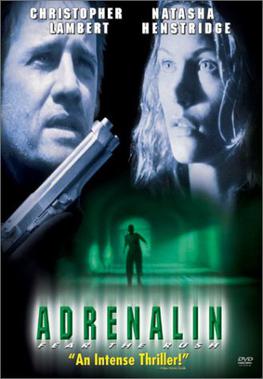
Adrenalin: Fear the Rush is a 1996 American science fiction-action film written and directed by Albert Pyun and starring Christopher Lambert and Natasha Henstridge. It is set in an alternative future in 2007, where the Russian Federation has collapsed and Eastern Europe is in disarray. Out of this chaos an unknown virus covers the Earth and eventually the United States.
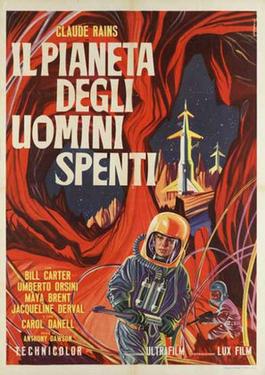
Battle of the Worlds is a 1961 Italian science fiction film directed by Anthony Dawson. The film stars Claude Rains, Bill Carter, and Maya Brent.

Alien from L.A. is a 1988 science fiction film directed by Albert Pyun and starring Kathy Ireland as a young woman who visits the underground civilization of Atlantis. The film was featured on Mystery Science Theater 3000. This film is loosely based on Jules Verne's 1864 novel Journey to the Center of the Earth with some minor allusions to The Wizard of Oz.
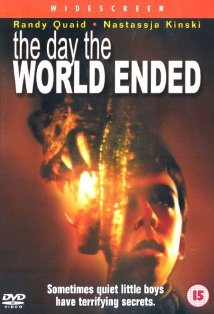
The Day the World Ended is a 2001 American science fiction/horror television film and is the fourth in the Creature Features series broadcast on Cinemax. It stars Nastassja Kinski, Randy Quaid, and Bobby Edner.
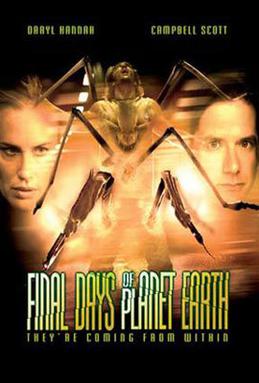
Final Days of Planet Earth is a 2006 science fiction miniseries directed by Robert Lieberman and written by Roger Soffer. Starring Campbell Scott, Gil Bellows, and Daryl Hannah, the movie was produced by RHI Entertainment for the Hallmark Channel.

Journey to the Center of the Earth is a 1989 fantasy film. It was a nominal sequel to the 1988 film Alien from L.A., both of which are (very) loosely based on the 1864 novel Journey to the Center of the Earth by Jules Verne.

The Day the Earth Stopped is a 2008 American direct-to-DVD science fiction action horror film produced by independent studio The Asylum, directed by and starring C. Thomas Howell. It is a mockbuster of the 2008 remake of The Day the Earth Stood Still, which was released three days later. Howell stars as the protagonist, soldier Josh Myron, who witnesses the arrival of giant alien robots that threaten to destroy the Earth unless they are shown the value of human existence.

Nemesis 3: Prey Harder is a 1996 science fiction film directed and co-written by Albert Pyun. It is the sequel to Nemesis 2: Nebula (1995) and was followed by Nemesis 4: Death Angel (1996).

End of the World is a 1977 American science fiction film directed by John Hayes.
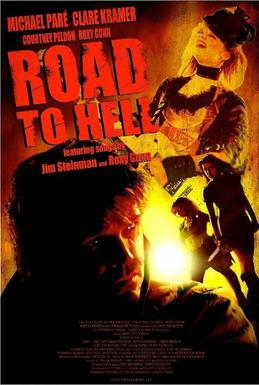
Road to Hell is a 2008 action-fantasy film directed by Albert Pyun. It was inspired by Walter Hill's Streets of Fire and began shooting that same year in June at Los Angeles. Pyun states that the genesis of Road to Hell was when he and Paré attended a film festival in Spain.

Buck Rogers in the 25th Century is a 1979 American science fiction adventure film directed by Daniel Haller. Starring Gil Gerard in the title role and Erin Gray as Colonel Wilma Deering, it was produced by Glen A. Larson who co-wrote the screenplay with Leslie Stevens, based on the character Buck Rogers which was created by Philip Francis Nowlan in 1928. It was originally made as a television pilot, but Universal Pictures opted to release the movie theatrically several months before the subsequent television series aired.
References
- ↑ Richard Scheib (2008-03-09). "DECEIT". Moria. Archived from the original on 2010-05-15. Retrieved 2010-05-01.
- ↑ "Deceit (1992)". February 14, 2017.
- ↑ Stanley, J. (2000) Creature Feature: 3rd Edition
- ↑ Mick Martin; Marsha Porter (2001). Video Movie Guide 2002. Ballantine Books. p. 277. ISBN 0-345-42100-0.
- 1 2 3 "Deceit (1989)". December 24, 2002.
- 1 2 "Deceit". TVGuide.com.
- ↑ Nicanor Loreti (2008-08-09). "Filmmaker Interview: Albert Pyun". Fear Zone. Archived from the original on 2013-06-22. Retrieved 2010-05-01.
- ↑ "Is it finally time for the director of the original Captain America to get some love?". Gizmodo.